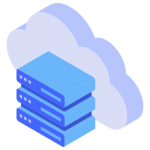What is Cloud?
"The cloud" refers to servers that are accessed over the Internet, and the software and databases that run on those servers. Cloud servers are located in data centers all over the world. By using cloud computing, users and companies don't have to manage physical servers themselves or run software applications on their own machines. Cloud computing is the on-demand availability of computer system resources, especially data storage (cloud storage) and computing power, without direct active management by the user. The term is generally used to describe data centers available to many users over the Internet. Large clouds, predominant today, often have functions distributed over multiple locations from central servers. If the connection to the user is relatively close, it may be designated an edge server.
Types of Cloud

Private Cloud
A Private Cloud is typically defined as everything behind a company's walls. These kinnds of systems operate in a company's local data centres, although some companies prefer to use colocated data centre facilities.

Public Cloud
The Public cloud includes a whole host of services and companies. The most common names are AWS, Microsoft Azure and Hapih Host Cloud. However, you may also hear software as a service such as MS OFFICE 365, Included

Hybrid Cloud
A Hybrid Cloud deployment most typically describes a company is operating both a Private Cloud and Public Cloud. In Hybrid Cloud environment, The private and public services are integrated with one another.

Multi Cloud
A multi-cloud strategy is an approach that operates any combination of Priavte, Public and Hybrid Clouds. An organisation may have multiple Public and Private Clouds or multiple hybrid clouds all either connected together or not.
What is Private Cloud?
The "Private Cloud" is defined as computing services offered either over the Internet or a private internal network and only to select users instead of the general public. Also called an Internal or Corporate Cloud, Private Cloud computing gives businesses many of the benefits of a Public cloud - including self-service, scalability and elasticity - with the additional control and customization available from dedicated resources over a computing infrastructure hosted on-premises. But in a private cloud, the services and infrastructure are always maintained on a private network and the hardware and software are dedicated solely to your organization.
In this way, a private cloud can make it easier for an organization to customize its resources to meet specific IT requirements. Private clouds are often used by government agencies, financial institutions, any other mid- to large-size organizations with business-critical operations seeking enhanced control over their environment. One drawback is that the company’s IT department is held responsible for the cost and accountability of managing the private cloud. So private clouds require the same staffing, management, and maintenance expenses as traditional data center ownership.
Two models of Private Cloud

IaaS
The first is Infrastructure as a Service (IaaS) which allows a company to use infrastructure resources such as compute, network and storage as a service.

PaaS
The second is the Platform as a Service (PaaS) which lets a company deliver everything from simple cloud-based applications to sophisticated-enabled enterprise applications.
Private clouds can also be combined with public clouds to create a hybrid cloud, allowing the business to take advantage of cloud bursting to free up more space and scale computing services to the public cloud when computing demand increases.
Contact Form
For More Details or Queries, You can submit the form below
